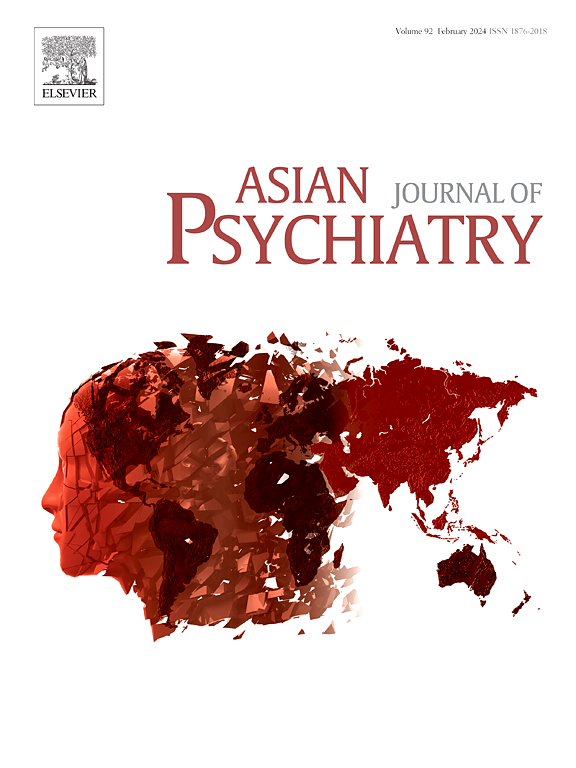Aberrant predictive learning along the positive schizotypy - autistic traits continuum: evidence from ambiguous social information processing
IF 4.5
4区 医学
Q1 PSYCHIATRY
引用次数: 0
Abstract
Deficits in social information processing have been observed in both schizophrenia spectrum disorders (SSD) and autism spectrum disorder (ASD), though the underlying mechanisms may differ. From a predictive coding perspective, such deficits are thought to arise from an overreliance on prior expectations in SSD, whereas individuals with ASD may exhibit difficulties in forming or using such expectations. However, very few studies have investigated the behavioral markers underlying social predictive learning along the ASD-SSD continuum. Using a novel cue–outcome associative learning task, this study examined how prior expectations influence the perception of ambiguous social information. A total of 121 healthy participants (aged 17–25) completed the task, along with self-report measures of positive schizotypal (Schizotypal Personality Questionnaire, SPQ; Community Assessment of Psychic Experiences, CAPE) and autistic traits (Autism Spectrum Quotient, AQ). Computational modeling using the Hierarchical Gaussian Filter (HGF) and correlational analyses revealed that higher levels of positive schizotypal traits were associated with greater reliance on prior beliefs and reduced flexibility in updating prediction errors. In contrast, expected inverse associations for autistic traits were not consistently observed. These results support the hyper-prior hypothesis of schizophrenia and highlight aberrant predictive mechanisms in positive schizotypy. The predictive coding framework might be useful for differentiating between SSD- and ASD-related social cognitive difficulties, with implications for targeted intervention strategies.
积极分裂型-自闭症特征连续体的异常预测学习:来自模糊社会信息加工的证据
社会信息处理缺陷在精神分裂症谱系障碍(SSD)和自闭症谱系障碍(ASD)中都有观察到,尽管潜在的机制可能不同。从预测编码的角度来看,这种缺陷被认为是由于SSD过度依赖先前的期望,而患有ASD的个体可能在形成或使用这种期望方面表现出困难。然而,很少有研究调查了ASD-SSD连续体中社会预测学习的行为标记。本研究采用一种新颖的线索-结果联想学习任务,考察了先验期望如何影响对模糊社会信息的感知。共有121名健康参与者(17-25岁)完成了这项任务,并进行了积极分裂型自我报告(分裂型人格问卷,SPQ;精神体验社区评估,CAPE)和自闭症特征(自闭症谱系商,AQ)。使用分层高斯滤波器(HGF)的计算模型和相关分析显示,较高水平的积极分裂型特征与对先验信念的依赖程度较高相关,并且在更新预测错误时灵活性降低。相反,预期的自闭症特征的负相关并没有被一致地观察到。这些结果支持了精神分裂症的超先验假说,并强调了阳性分裂型的异常预测机制。预测编码框架可能有助于区分SSD和asd相关的社会认知困难,并对有针对性的干预策略产生影响。
本文章由计算机程序翻译,如有差异,请以英文原文为准。
求助全文
约1分钟内获得全文
求助全文
来源期刊

Asian journal of psychiatry
Medicine-Psychiatry and Mental Health
CiteScore
12.70
自引率
5.30%
发文量
297
审稿时长
35 days
期刊介绍:
The Asian Journal of Psychiatry serves as a comprehensive resource for psychiatrists, mental health clinicians, neurologists, physicians, mental health students, and policymakers. Its goal is to facilitate the exchange of research findings and clinical practices between Asia and the global community. The journal focuses on psychiatric research relevant to Asia, covering preclinical, clinical, service system, and policy development topics. It also highlights the socio-cultural diversity of the region in relation to mental health.
 求助内容:
求助内容: 应助结果提醒方式:
应助结果提醒方式:


